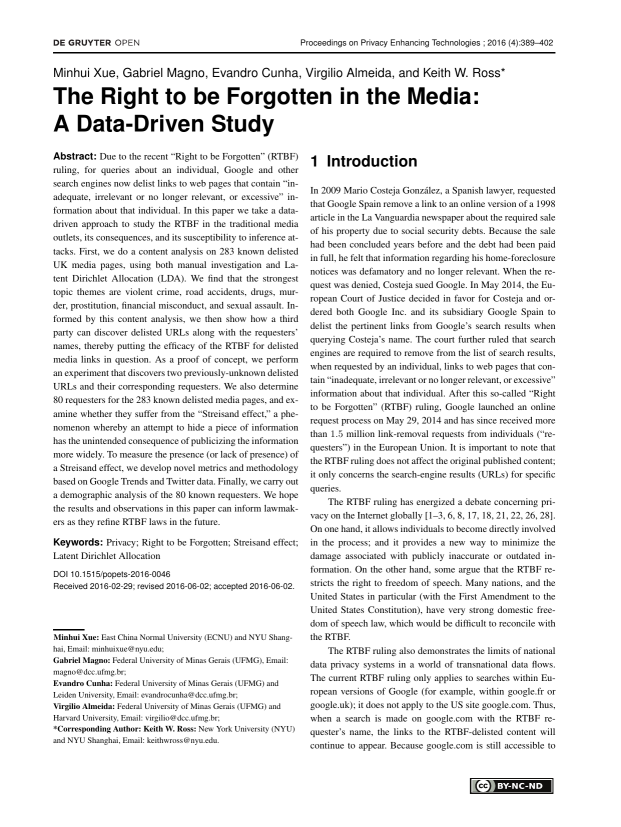The Right to be Forgotten in the Media: A Data-Driven Study
Authors: Minhui Xue (East China Normal University (ECNU) and NYU Shanghai), Gabriel Magno (Federal University of Minas Gerais (UFMG)), Evandro Cunha (Federal University of Minas Gerais (UFMG) and Leiden University), Virgilio Almeida (Federal University of Minas Gerais (UFMG) and Harvard University), Keith W. Ross (New York University (NYU) and NYU Shanghai)
Volume: 2016
Issue: 4
Pages: 389–402
DOI: https://doi.org/10.1515/popets-2016-0046
Abstract: Due to the recent “Right to be Forgotten” (RTBF) ruling, for queries about an individual, Google and other search engines now delist links to web pages that contain “inadequate, irrelevant or no longer relevant, or excessive” information about that individual. In this paper we take a datadriven approach to study the RTBF in the traditional media outlets, its consequences, and its susceptibility to inference attacks. First, we do a content analysis on 283 known delisted UK media pages, using both manual investigation and Latent Dirichlet Allocation (LDA). We find that the strongest topic themes are violent crime, road accidents, drugs, murder, prostitution, financial misconduct, and sexual assault. Informed by this content analysis, we then show how a third party can discover delisted URLs along with the requesters’ names, thereby putting the efficacy of the RTBF for delisted media links in question. As a proof of concept, we perform an experiment that discovers two previously-unknown delisted URLs and their corresponding requesters. We also determine 80 requesters for the 283 known delisted media pages, and examine whether they suffer from the “Streisand effect,” a phenomenon whereby an attempt to hide a piece of information has the unintended consequence of publicizing the information more widely. To measure the presence (or lack of presence) of a Streisand effect, we develop novel metrics and methodology based on Google Trends and Twitter data. Finally, we carry out a demographic analysis of the 80 known requesters. We hope the results and observations in this paper can inform lawmakers as they refine RTBF laws in the future.
Keywords: Privacy; Right to be Forgotten; Streisand effect; Latent Dirichlet Allocation
Copyright in PoPETs articles are held by their authors. This article is published under a Creative Commons Attribution-NonCommercial-NoDerivs 3.0 license.

